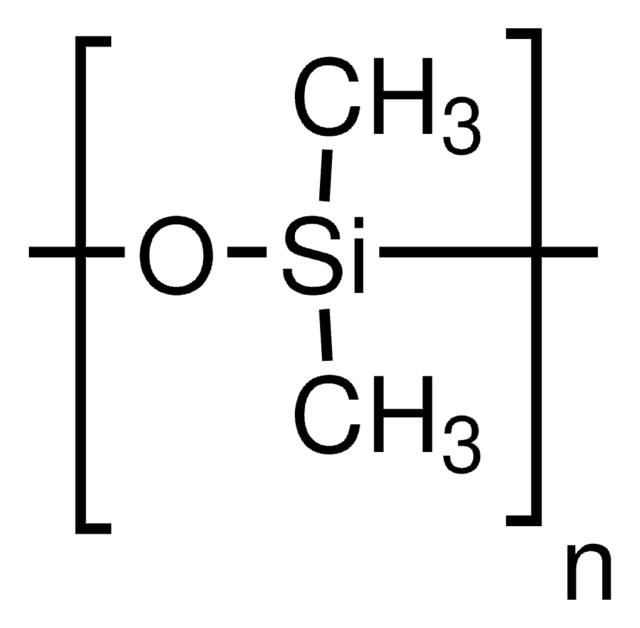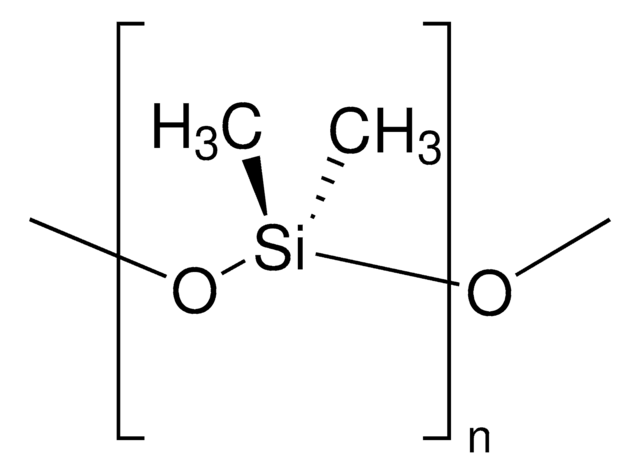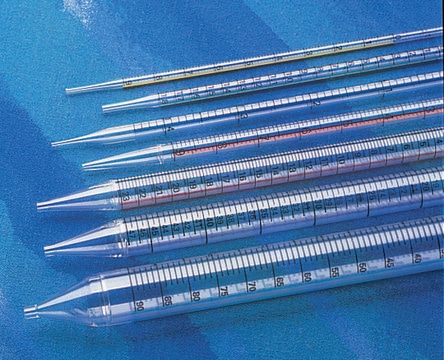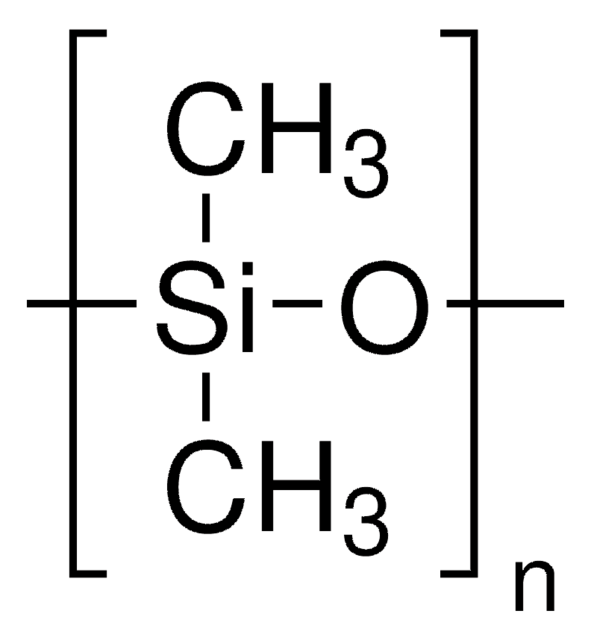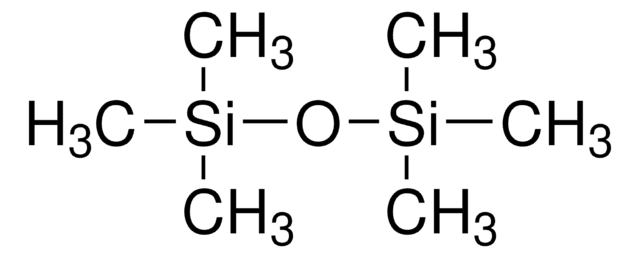DMPS5X
Dimethylpolysiloxane
viscosity 50 cSt (25 °C)(lit.)
Sinónimos:
Polydimethylsiloxane
Iniciar sesiónpara Ver la Fijación de precios por contrato y de la organización
About This Item
Número de CAS:
Número MDL:
Código UNSPSC:
12352200
ID de la sustancia en PubChem:
NACRES:
NA.25
Productos recomendados
Formulario
liquid
Nivel de calidad
mol peso
~3,780
viscosidad
50 cSt(25 °C)(lit.)
InChI
1S/C2H6OSi/c1-4(2)3/h1-2H3
Clave InChI
SEUDSDUUJXTXSV-UHFFFAOYSA-N
¿Está buscando productos similares? Visita Guía de comparación de productos
Aplicación
Dimethylpolysiloxane has been used:
- in culturing mouse embryos
- in preparation of oil-based nano-adjuvant candidates
- to reduce the brain movement in the post-cat craniotomy process
Clear, colorless fluid polymer useful as a stationary phase in gas chromatography and as an anti-foaming agent.
Acciones bioquímicas o fisiológicas
Dimethylpolysiloxane is a silicon-based organic polymer, inert and non-toxic. It is applicable in the pharmaceutical, food, and cosmetic industry. Dimethylpolysiloxane is excreted unchanged unaltered in the faeces and is non-mutagenic.
Dimethylpolysiloxane is used in protein chromatography and affininty chromatography. Dimethylpolysiloxane was used to determine that postprandial inflammatory response after ingestion of heated oils in obese persons is reduced by the presence of phenol compounds.
Código de clase de almacenamiento
10 - Combustible liquids
Clase de riesgo para el agua (WGK)
WGK 2
Punto de inflamabilidad (°F)
609.8 °F - closed cup
Punto de inflamabilidad (°C)
321 °C - closed cup
Equipo de protección personal
Eyeshields, Gloves, multi-purpose combination respirator cartridge (US)
Elija entre una de las versiones más recientes:
¿Ya tiene este producto?
Encuentre la documentación para los productos que ha comprado recientemente en la Biblioteca de documentos.
Los clientes también vieron
Zengguang Ma et al.
Neuroscience letters, 637, 161-167 (2016-11-20)
Understanding the mechanisms underlying negative hemodynamic responses is critical for the interpretation of functional brain imaging signals. Negative imaging signals have been found in the visual, somatosensory and motor cortices in functional magnetic resonance imaging (fMRI) and intrinsic signal optical
Comparison of cortical responses to the activation of retina by visual stimulation and transcorneal electrical stimulation.
Sun, et al.
Brain Stimulation, 11, 667-675 (2019)
A Perez-Herrera et al.
Molecular nutrition & food research, 56(3), 510-514 (2011-12-14)
Heating during the process of cooking alters the chemical properties of foods and may affect subsequent postprandial inflammation. We tested the effects of four meals rich in different oils subjected to heating on the postprandial inflammatory metabolism of peripheral blood
Vyacheslav N Fishman et al.
Chemosphere, 84(7), 913-922 (2011-07-09)
The applicability of three different Silphenylene Silicone co-polymer (Si-Arylene) GC stationary phases (J&W Scientific DB-5ms, Varian VF-5ms, and VF-Xms) has been evaluated for the separation of all 136 tetra- through the octa- chlorinated dibenzo-p-dioxins (PCDD) and chlorinated dibenzofurans (PCDF) from
Mara I Orozco et al.
Journal of agricultural and food chemistry, 59(13), 7194-7202 (2011-06-08)
The influence of deep frying, mimicked by 20 heating cycles at 180 °C (each cycle from ambient temperature to 180 °C maintained for 5 min), on the unsaponifiable fraction of vegetable edible oils represented by three characteristic families of compounds
Nuestro equipo de científicos tiene experiencia en todas las áreas de investigación: Ciencias de la vida, Ciencia de los materiales, Síntesis química, Cromatografía, Analítica y muchas otras.
Póngase en contacto con el Servicio técnico